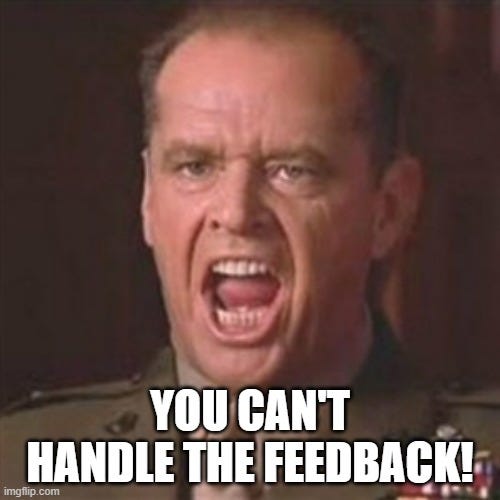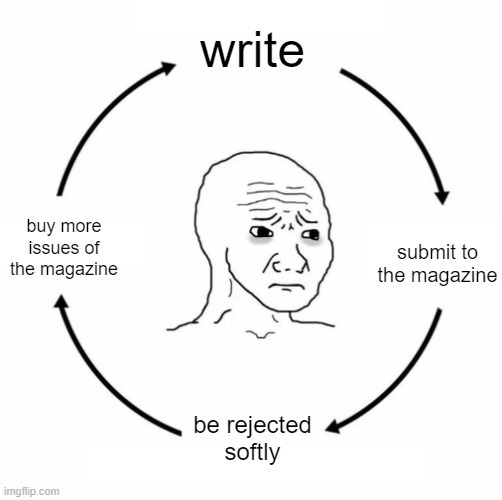The case against soft form rejections
Full context: I manage a indie magazine with a small team. We pay 1 cent per word, strive to answer in 1 month, and every rejection we send is personal. I also occasionally joined the editorial team of other literary magazines.
I don’t go a day without seeing the same debate over Twitter or Discord. Authors forced to swallow the usual form rejections over and over until desperation sets in. “Are my stories even being read?”.
While many of us are aware, on some level, that the market runs on fumes and questionable practices, I thought useful especially for newer writers to lay down some basic information.
Exhibit A and B are standards of what you can expect if you ever submit your work to literary magazines (or query agents). You might get some variants of “best fortune placing it elsewhere”, “while I loved it, I am afraid I have to pass this time” and “we had many strong candidates”.
Now, in case you’re new to the rodeo, form rejections are a bad industry practice. Submitting writers have to put up with it because - frankly - they can’t do any better and would do anything to score a publication1.
Now, most literary magazine editors will tell you that:
They cannot possibly send personal rejections to everyone, since it would take too much time.
They cannot give personalized feedback, because it risks offending people. One chief editor I knew went as far as to whine “people can’t handle my criticism!”
Personal rejections take too much time
Kind of.
However, a lot of things in publishing take time - e.g. formatting, marketing, collaborating with cover artists, reading the stories in the fist place, so on and so forth.
The crucial difference? A poorly managed publishing process impacts on the quality of the final product, and thus, sales. Rejecting people (a.k.a.: keeping good relationships with your main content supplier) can be done in a quick and streamlined manner and doesn’t impact on the final product. So it gets the cut.
It’s just not a priority.
Before you type angrily in the comments, please keep in mind that I managed a literary magazine for 3 years (still ongoing) and I didn’t send a form rejection once. The personal rejections I’m thinking of could easily be structured like this:
Dear Author Name,
Thanks for sending over “Short Story Title” for our consideration.
However, despite we liked this one good point of the story, this one bad point ruined its potential for us.
We wish you better luck next time.
Yours kindly
As you can see it all comes down to saying one good thing and one bad thing. The rest can be filled in automatically and requires no thinking. Hell, this process can even be offloaded to slush readers - they do most of the screening work anyway.
Feedback would offend our authors
I know this title sounds crazy, but bear with me.
When I mentioned to my editor in chief, during a casual chat, that I didn’t like sending out form I assisted to a melt down.
I was told that “unwanted feedback is rude,” and that if they were to truly speak their mind about some stories, they would “get the inbox flooded with complaints”. This stuck with me not only since its grossly untrue, but because it hinted at a larger issue.
Let’s get the obvious out - most writers would die for feedback from people in the knows. I don’t need to prove this to you because if you hang out in writer circles you already know it. Writers, especially new ones, are so starved for feedback that they will swap reads, pass their stories around like a joint on a Friday night, and call in favors from peers and teachers. The idea that honest feedback is rude is ludicrous.
What that editor in chief probably meant to say was, “I consider most stories I reject a waste of words and most importantly, my time” and “I couldn’t give any feedback that wasn’t scathing.”
Do people complain if they hear why you didn’t like your story? Yes. It happened to me a couple of times. Around five percent of writers are opinionated enough that they will stand up for their broken, messy shorts, and will tell you.
And here comes the good part. The issue is not receiving their angry responses in your inbox. The issue is that more often than not they will remember the interaction they had with you badly, so they won’t buy the magazine, nor share it on social media, nor suggest it to their peers.
Writers are readers first, and readers are revenue.
Not hurting the bottom line
In this light, those extremely soft-spoken rejections can be explained in another light. People are not supposed to fall in love with a story - getting a jaded creature like an editor to like it is more than enough.
Those examples and the standard form rejection are shorthand, non-committal answers that serve the best interest of any magazine at the expense of, well, a honest touch. A bit dramatic, of course, but the game is so skewed in favor of editors that, as you likely already know, most people would accept anything in hope of getting published.
At the end of the day, maybe it’s impossible to support litmags without recurring to such base business practices. But then again, we’re dealing with art - and we should keep businessmen’s grubby hands far from it.
So, subscribe and ring the bel— wait, there’s not bell?
At the end of the day, is it worth to gather 30 rejections for a single short story… when you could publish or self-publish it and reach your reader?








